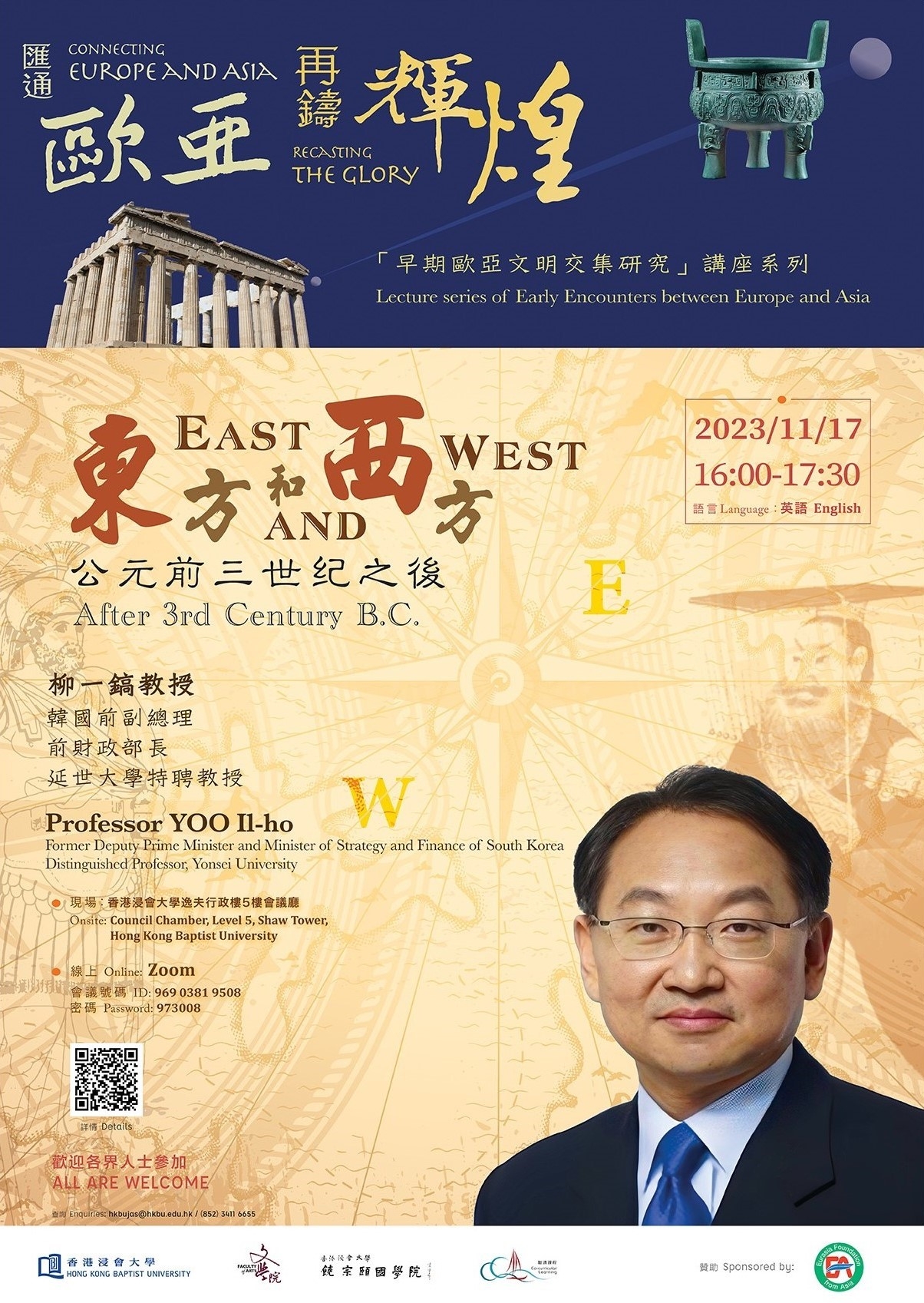
Connecting Europe and Asia, Recasting the Glory: Lecture series of Early Encounters between Europe and Asia
Lecture 8: East and West; After 3rd Century B.C.
2023/11/17│16:00–17:30
Professor YOO Il-ho
Former Deputy Prime Minister and Minister of Strategy and Finance of South Korea
Distinguished Professor, Yonsei University
- Abstract:In the late 3rd century B.C., there arose two empires in the world, Han in the East, Rome in the West
In the next century, however, both countries faced the difficulty mainly due to the economic reason. In Han dynasty, debate over the monopoly of the salt, iron and the liquor, while in Rome, the debate over economic policy —agricultural land act, taxation etc., occurred. After the resolution of such turmoils, both world began to develop following their own paths. Could these be the beginning of the differences in the two worlds, that happened after 19th century?
- Language: English
- Summary (Recorded by Zhang Zixuan)
Former Deputy Prime Minister and Minister of Strategy and Finance of South Korea, Yoo Il-ho, Distinguished Professor at Yonsei University, gave a lecture titled ‘East and West: After the Third Century BCE’ to the Academy of Sinology. First, going straight to the heart of the matter, he showed that in both East and West, two seismic historic events happened in the third century BCE: in 202 BCE, the Western Han dynasty was founded, while in 201 BCE, the Second Punic War was brought to its conclusion, and for these reasons, the political systems of both East and West were greatly able to consolidate their stability during this era.
In the sixth year of the reign of the Han dynasty emperor Zhaodi (81 BCE), the Han dynasty convened a celebrated conference on the monopolies of salt and iron. At this event, officials debated whether to abolish the governmental institutions that were solely responsible for managing the selling of salt, iron, and wine. Professor Yoo introduced the relevant issues by articulating that officials led by Sang Hongyang opposed the abolition of selling salt and iron in this way, regarding instead the salt and iron monopolies as an important foundation of imperial prosperity; however, in the final analysis, the Han dynasty government still abolished the sole responsibility for selling wine and in some districts enacted similar provisions pertaining to iron. This meant that, to some extent at least, ideal policies were implemented by officials who were ‘virtuous and cognisant of the Confucian classics’. Against the background of fluctuations of government policy and within the debates between the two parties, we can truly appreciate the advocacy or otherwise of various aspects of economic thinking of the three schools—Confucian, legalist, or Daoist. Subsequently, Confucian perspectives on economics became the dominant force in East Asia and remained so until the nineteenth century, though this viewpoint was itself challenged from time to time.
To alleviate conflict between different social classes, in the Roman world, the Gracchi brothers attempted to implement economic policies that included reforms in respect of laws pertaining to agriculture and land ownership as well as matters of taxation. Their hope was to solve appropriately practical problems caused by a situation by which Rome, having become the dominant power in the Mediterranean through military expansion, experienced a swift growth in wealth coupled with peasant bankruptcy owing to the concentration of land ownership under a swiftly growing system of slave ownership, to say nothing of issues related to how to maintain the size of the military. Their reforms, however, also came into conflict with vested interests who lived off the fat of the land, and having received thorough cross-examination, censure, and then obstruction, these policies, as promulgated by the Gracchi brothers, proved unsuccessful and had finally to be abandoned.
Having introduced these two economic debates of the Han dynasty and Roman empires, Professor Yoo concluded by saying that although the economic policies of Sang Hongyang and the Gracchi brothers met with obstacles, their fundamental ideas and policies had however a profound impact on subsequent generations.
- Lecture video
HKBUTube
Bilibili
This lecture series is sponsored by Eurasia Foundation (from Asia).